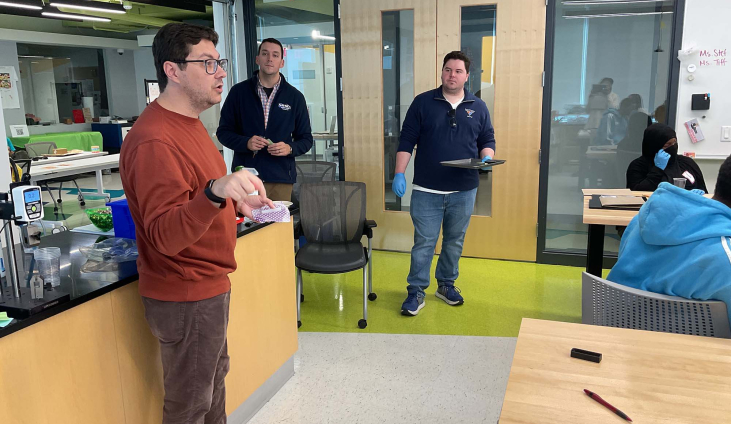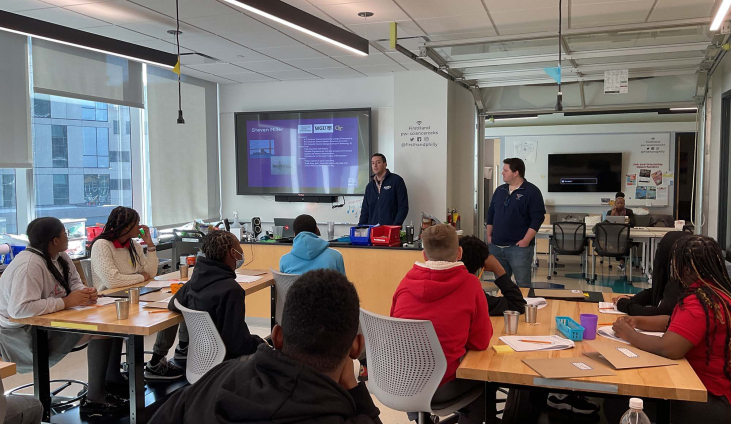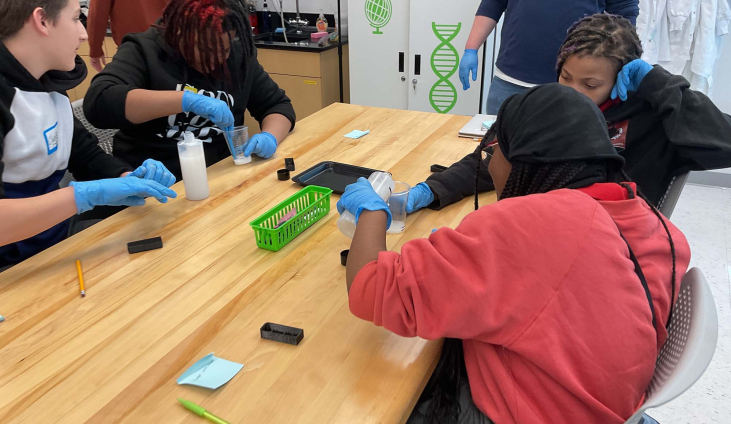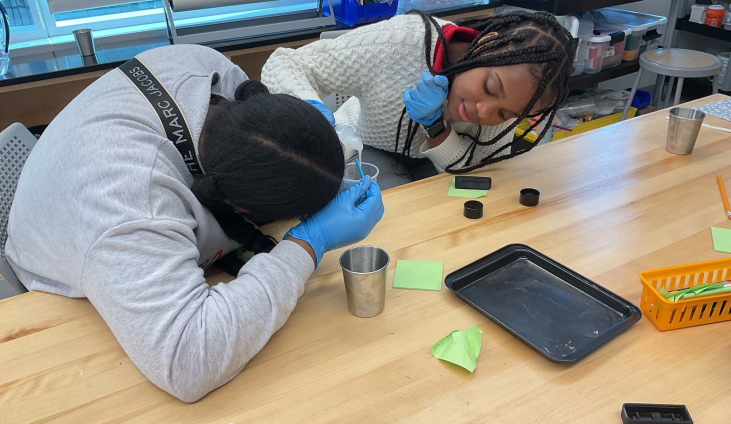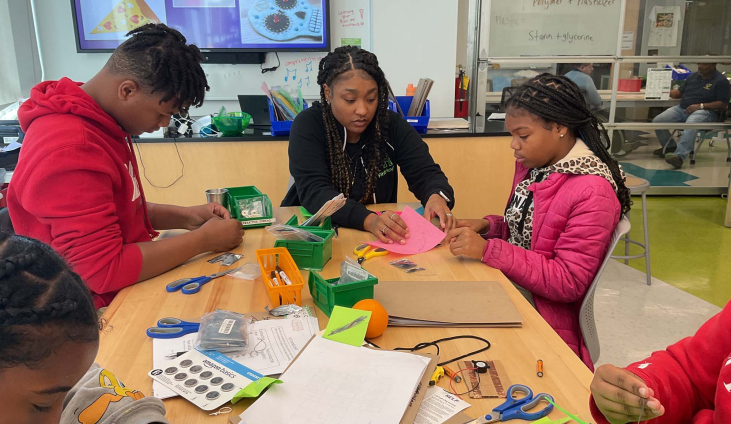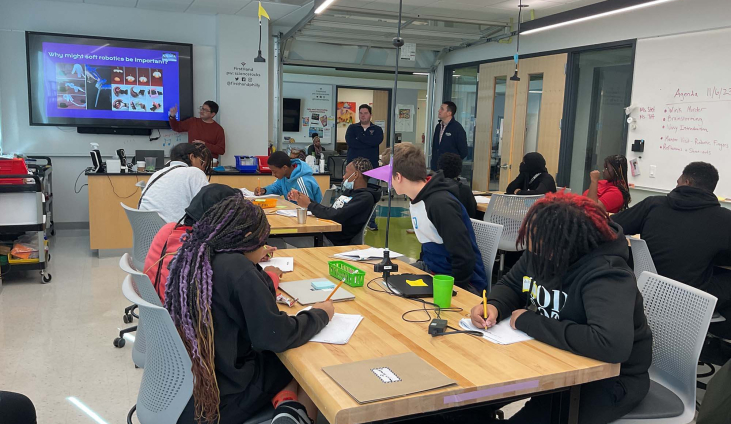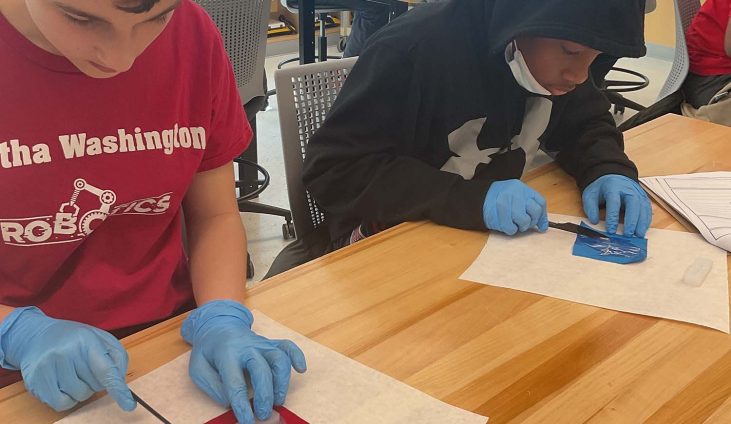In 2022, FirstHand was awarded $599,195 from the Office of Naval Research (ONR) STEM Education and Workforce Program. A year into the grant, the Science Center has engaged 43 Philadelphia middle school students in an innovative e-textiles and wearable technology curriculum called Future Techstyles. To date, four Navy employees have volunteered a cumulative 14 hours of direct student mentorship to support this new curriculum.
In addition to using tools like Makey Makey and micro:bit to create functional, wearable technology throughout the curriculum, students are also guided by their mentors from the Navy, to make, test, and iterate on their own robotic finger using soft robotics.
In designing the activity, Tristan grounded the work in research that shows soft robotics, rather than rigid robotics, are more likely to increase girls’ interest in engineering for a variety of reasons, including the societal relevance of soft robotics (Jackson, et al., 2021). Similarly, Black and Hispanic students prioritize career paths that give back to their communities more than their White peers (Garibay, 2015). In STEM fields, societal relevance refers to curricula, products, etc. that have a direct, often positive, impact on society. For example, soft robotic technology is used in balloons that re-open blocked arteries or in medical devices that control blood pressure. By learning about applications of soft robotics, students can envision a STEM career path where they help their family and communities. With the goal of creating positive learning experiences for all students, the incorporation of soft robotics has been one more way to engage our core audience in STEM.
This summer, two Future Techstyles students stayed after class to tinker with their soft robotics creations, and Tristan and his colleague Nicole Hanley, a chemical engineer, stuck around to help the students despite their busy schedule. Those same students were so excited about the activity that they stayed to help the afternoon class, and the next day came up with the idea to test if their designs were “leak-proof.” In Tristan’s words, “even when students experienced adversity with their designs or the fabrication process, they returned to the drawing board and tried again, truly embodying the principles of the engineering design process.”
Our work with the Navy doesn’t stop with Future Techstyles, though! After months of planning with NIWC Pacific – Philadelphia and NSWCPD, we launched our Cybersecurity Sprint in fall 2022. FirstHand Sprints, our intensive trainings open to all Philadelphia high school students, are co-developed and co-facilitated in connection with industry. Sprints are currently supported by a PAsmart grant from the Pennsylvania Department of Education.

Since 2022, FirstHand and the Navy have co-delivered the Cybersecurity Sprint to 18 students across two cohorts and 30 hours of programming, boasting an impressive 70 hours of direct student mentorship – primarily from James Thomas (JT), IT Specialist and STEM Site Coordinator at NIWC Pacific - Philadelphia, and Steven Miller, Software Engineer at NSWCPD. JT and Steven lean into their professional strengths, trading off who teaches what lesson ranging from networking, to coding, to encryption, all with full logistics and instructional support from the FirstHand facilitation team.
Natalie Sanchez, a student who participated in the Cybersecurity Sprint in spring 2023, found her love for computer science during the program, and went on to complete a paid internship with PECO. So impressed with her work, PECO extended Natalie’s internship and she helped to co-develop and co-deliver FirstHand’s newest sprint, Philly Data Miners, alongside professionals from PECO and CHOP.
Long story short, the Navy has a lot to do with STEM education. Especially at FirstHand.

